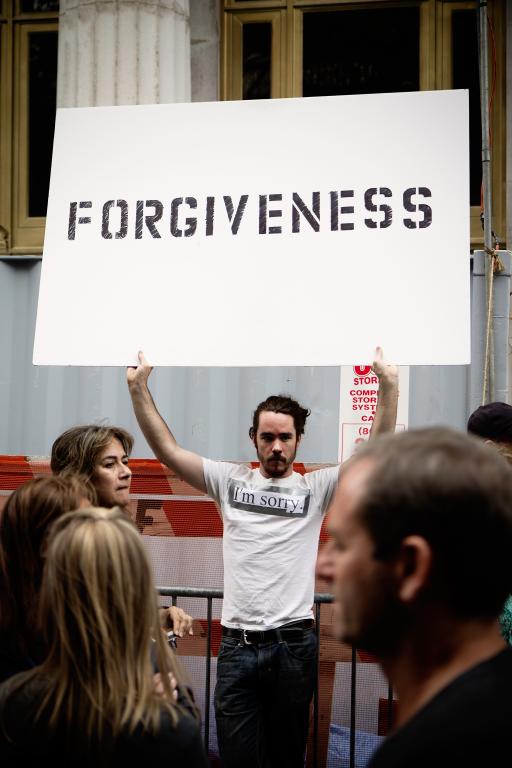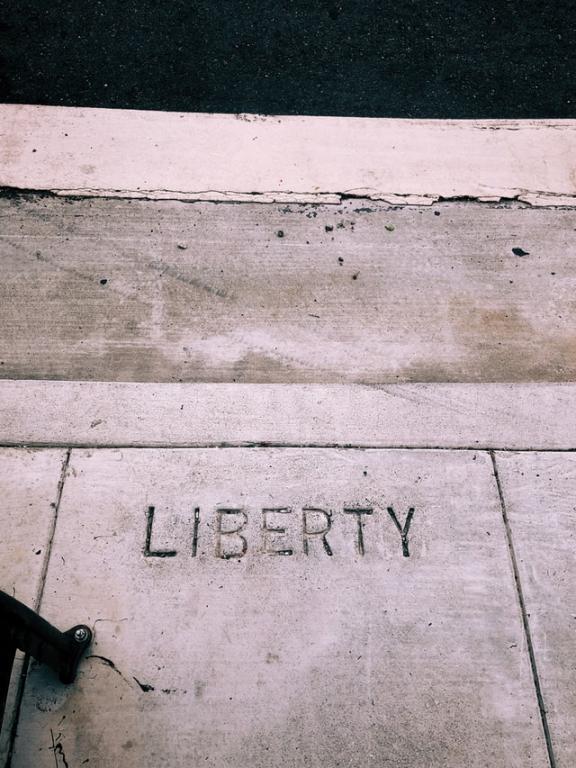
How dare you ask for an apology! Or so that’s how the message goes. If you look around, it seems that everyone, everywhere are demanding the ultimate “I am sorry” and the requests are taken as the grandest of offenses. Never mind what has been said or done; who would have the nerve (especially in this society of all societies) to ask for an apology?!
If you have been paying attention to the news cycles, you’ll see a common demonstration of refusal; from all sides, at all times; to apologize. The headlines, the tweets, and the conversations over the past week have all rested on this one audacious notion: that someone, somewhere, deserved an apology. News reporters were flocking to candidates, State senators, and House representatives; all seeking to find the ultimate answer: “Do you think you owe so-and-so an apology?” or “Do you think so-and-so owes you an apology?”
Deserved & Offended
Allow me to first point out the hazard of placing the terms “deserve” and “apology” in the same sentence. The standard for today is that we all deserve everything. We are the most deserving nation on earth. Everything must be handed to us, for free, because we “deserve” it.
Secondly, the word “apology” is as offensive of a term as “lib-tard” is for the Left and “boot-licker” for the Right. Most people believe that when they are saying three simple words: “I am sorry,” that it must also mean they are admitting they are wrong. As in your views are wrong, your beliefs are wrong, your values are wrong, or your self-identifying label is wrong. Such is not always the case.
Apology & Wrongness
Even if apologizing does imply wrongness, is admitting when you are wrong such an incredibly horrible thing? Is it really all that audacious to say “I am sorry”? When I was growing up, in our house it was audacious not to say “I am sorry.” In fact, I was more at risk of further punishment for not saying those three little words.
The apology was not for myself, it was for whomever I had offended or hurt- either verbally or physically. The apology was a way to acknowledge that the acts (or speech) that I committed had a consequence. A negative consequence imparted on the other, not myself. Whether or not it was intentional was of little regard.
An apology does not necessarily equate to wrongness but it does recognize that some form of harm was done. In turn, however, an apology is a very fine way of acknowledging wrongness. We really ought to reconsider this rebel notion that saying “I am wrong” is a cruel act against humanity.
Pride & Shame
What an apology demonstrates, however, is humility. What keeps us from apologizing is both pride and shame.
It’s pride that compels us to refuse to apologize. It’s pride that reiterates a message in our head that this is somehow about wrongness and weakness. Therefore, if I didn’t do anything wrong, why would I apologize? If I didn’t do anything wrong, I shouldn’t have to lower myself to such weak appearances. It’s pride that excuses us from having to critically think about what we say or do. It’s pride that blocks out the sunlight necessary to grow and transform.
It’s shame that renders us incapable of uttering the words “I am sorry”. Shame reminds us that if we do apologize, we will look weak, like we don’t know how to hold our position, and also, again, that we are wrong. For some, admitting to being wrong means admitting to sin. Shame is also the voice that says the apology won’t matter- it may not be received, it won’t make a difference, it won’t be enough.
Apology & Weakness
How can we help it? Our society inundates us with so many contradictory messages about what these three little words mean that we just run with the crowd and do what everyone else is doing. Mainly, refusing to apologize. Some messages tell us “whatever you say ‘I am’ to, you are.” Which means, I will not say that I am sorry if it can implicitly suggest that I am sorry.
We simply have been programmed to believe that the word “sorry” is just too sorry of a word to mention. Some articles go as far as to give you top 5 signs of how saying “sorry” makes you look weak, like you have no respect for boundaries, or, that you value your own feelings less than another’s. While I realize the context of how we apologize matters, not everyone understands the technique of nuance. And because our society has been demonstrating more and more that logical consistency is a thing of the past; we apply our understanding of the apology in very narrow terms.
Apology & Restoration
For a moment, let’s consider how you would feel if someone would have simply said “I am sorry”. Instead of deflecting away from, projecting onto, or scapegoating; for most of us, those three little words can make all the difference. Having the audacity to apologize humanizes the entire conflict. Saying “I am sorry” can be rather restorative and regenerative. But alas, pride and shame get in the way of grace and redemption.
Combating pride and shame takes an even more audacious action; it requires that we humble ourselves. It means that we fully actualize true humility- as practiced by Jesus.
Jesus & Apology
I liken the idea of apologizing humbly (and sincerely) to the last words of Jesus on the cross. This does not mean that Jesus owed anyone an apology, mind you, because he didn’t. Did God owe us an apology for our evil ways? No. Absolutely not. However, the message is still arguably blatant and there is much we can learn from it.
“Father, forgive them, for they know not what they do.”
Jesus, emptying himself of his divine nature, became fully human, and died after professing the greatest apology for and to all human kind. What did Jesus have to be sorry for? He was the ultimate innocent scapegoat, crucified by humanity, for daring to have the audacity to love as God loves- to love as God.
In turn, Jesus asked not for an apology, but for all to love one another. “As I have loved you,” Jesus laments. (John 13:34)
Love is the Apology
You see, love is the apology. Love itself is the greatest way that we can say “I am sorry”. Love, extended through humility, through self-emptying- kenosis, as it is often coined- is the ultimate display of grace.
“But he said to me, “My grace is sufficient for you, for my power is made perfect in weakness.” Therefore I will boast all the more gladly about my weaknesses, so that Christ’s power may rest on me.” (2 Corinthians 12:9)
God is love. Love encompasses all that God is. Perhaps the inability to extend an apology comes from a misplaced understanding of how we secure ourselves with God’s love? To that effect, could that mean that the insecurity we feel when prompted with the invitation to apologize means that we are insecure with our own love of God? How can we remedy that?
Confident Humility
In his newly released book, Confident Humility (Fortress Press), Dan Kent offers a rather provocative, yet compelling way to secure ourselves in God’s love so that our humility can flourish.
“Securing yourself in God’s love also neutralizes two of the most potent psychological toxins in life: shame and pride. Humility prompts you to fight against both shame and pride, in yourself and in others. Those drowning in self-contempt, build up. Those who are arrogant, correct. The call to humility is a call to confront both with equal passion and vigor. Humility means putting the love of God, demonstrated on the cross, at the center of our self-assessments- at the core of our heart.”
Insecurity fertilizes shame and pride much like Miracle-Grow fertilizes tomatoes and peppers. And while we all want plump, juicy tomatoes and enormous, crisp peppers; we do not need mutant-sized pride or shame growing in the garden bed of our heart.
It’s the call to humility that can confront and help eradicate the habitual impulse to revert to pride or shame as our default defense to reject apology altogether. And let’s be honest, as much as we reject the notion of apologizing to another, we also reject the apology from another as well.
When we put “the love of God at the center of our self-assessments”, as Kent insists that we should, the authenticity of our apology will be obvious, but more importantly, rooted in love.
Apology is Repentance
Apology is repentance, essentially. While I know many would like to say that repenting means “I am wrong”, I would argue that repentance, in its most basic understanding of the word- metanoia, means to change your mind, more so than it does to admit to being wrong.
Pride prevents us from changing our mind as much as shame does because again, changing your mind is often viewed as being wrong and therefore, also viewed as sinning. But changing your mind is not always about admission of “sin”. It can be seen as simply seeing things differently. Again, we live in an insta- reactionary society. We say and do things instantly, to keep up with the like-counters and the status updates and the retweets. When we react so quickly, even to the simple and harmless idea of the audacity of an apology; we stunt our own opportunity for not only self-reflection, but growth.
Apology is Transformation
More than that, an apology signifies an important-dare I say fundamental- aspect of transformation. Transformation comes through the heart and mind. Transformation allows us to see more deeply how our actions, however self-righteously justified, resulted in not love, but harm. What it then provides for us is the antidote for our ailment. Pride and shame are a sickness, and love and humility along with repentance, are the remedy. The remedy provides, for all, the stable environment for flourishing. Transformation implies a growth, does it not? And all things that grow do change.
Here is my call to action: Have the audacity to apologize. Even if it makes you feel like you are admitting you are wrong. Perhaps you are? Perhaps it’s not about being wrong or right. Could it be that we are just misinformed? Could it be that we incorrectly interpreted? Even more, having the audacity to apologize could reveal for us a better way to communicate and connect to others.
More on Confident Humility by Dan Kent.













